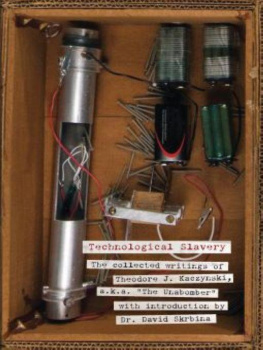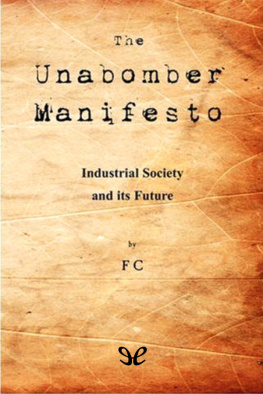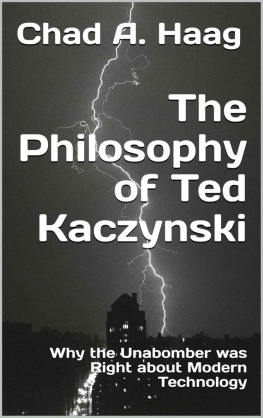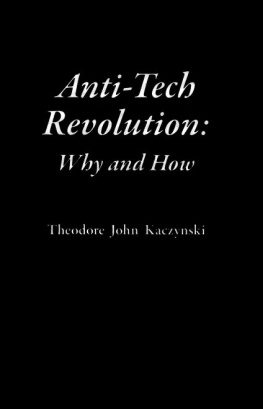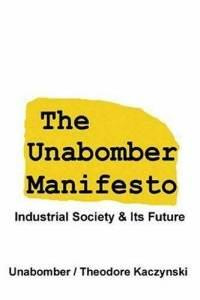Table of Contents
Technological Slavery
He that hath no sword, let him sell his garment, and buy one.
Luke 22:36
To the memory of Joy Richards,
with love.
From the Publisher
Theodore J. Kaczynski has been convicted for illegally transporting, mailing, and using bombs, as well as killing two people in California and one in New Jersey. He is now serving a life sentence in the supermax prison in Florence, Colorado.
Feral House has not published this book to justify the crimes committed by Mr. Kaczynski. But we do feel that there is a great deal of legitimate thought in this book, and the First Amendment allows readers to judge whether or not this is the case.
Technophiles like Ray Kurzweil and Bill Joy also expressed their regard for Theodore Kaczynskis writing:
Like many of my colleagues, I felt that I could easily have been the Unabombers next target. He is clearly a Luddite, but simply saying this does not dismiss his argument. As difficult as it is for me to acknowledge, I saw some merit in the reasoning in [Kaczynskis writing]. I started showing friends the Kaczynski quote from Ray Kurzweils The Age of Spiritual Machines; I would hand them Kurzweils book, let them read the quote, and then watch their reaction as they discovered who had written it.
Bill Joy, founder of Sun Microsystems, in Why the Future Doesnt Need Us, Wired magazine
AUTHORS NOTE TO THE SECOND EDITION
This book was first published by Editions Xenia under the title The Road to Revolution . Unfortunately, the Xenia edition was riddled with errors, most of which were not my fault. In this second edition, if the publisher has done his work properly, the errors have been corrected and the book has been improved in other ways.
I want to make clear that I have no control over the cover design of this book and no control over the way it is advertised and promoted. I expect it to be advertised and promoted in ways that I will find offensive. Moreover, I do not like the new title of the book. Nevertheless, I have cooperated in the creation of this new edition and consented to the change of title because I think it is important to make the book available in its present corrected and improved form.
Ted Kaczynski December 8, 2009
FOREWORD
I have to begin by saying that I am deeply dissatisfied with this book. It should have been an organized and systematic exposition of a series of related ideas. Instead, it is an unorganized collection of writings that expound the ideas unsystematically. And some ideas that I consider important are not even mentioned. I simply have not had the time to organize, rewrite, and complete the contents of this book.
The principal reason why I have not had time is that agencies of the United States government have created unnecessary legal difficulties for me. To mention only the most important of these difficulties, the United States Attorney for the Eastern District of California has formally proposed to round up and confiscate the original and every copy of everything I have ever written and turn over all such papers to my alleged victims through a fictitious sale that will allow the victims to acquire all of the papers without having to pay anything for them. Under this plan, the government would even confiscate papers that I have given to libraries, including papers that have been on library shelves for several years. The documents in which the United States Attorney has put forward this proposal are available to the public: They are Document 704 and Document 713, Case Number CR-S-96-259 GEB, United States District Court for the Eastern District of California.
At this writing, I have the assistance of lawyers in resisting the governments actions in regard to my papers. But I have learned from hard experience that it is unwise to leave everything in the hands of lawyers; one is well advised to research the legal issues oneself, keep track of what the lawyers are doing, and intervene when necessary. Such work is time-consuming, especially when one is confined in a maximum-security prison and therefore has only very limited access to law books.
I would have preferred to delay publication of the present book until Id had time to prepare its contents properly, but it seemed advisable to publish before the government took action to confiscate all my papers. I have, moreover, another reason to avoid delay: The Federal Bureau of Prisons has proposed new regulations that would allow prison wardens to cut off almost all communications between allegedly terrorist prisoners and the outside world. The proposed regulations are published in the Federal Register, Volume 71, Number 63, pages 16520-25.
I have no idea when the new regulations may be approved, but if and when that happens it is all too possible that my communications will be cut off. Obviously it is important for me to publish while I can still communicate relatively freely, and that is why this book has to appear now in an unfinished state.
The version of Industrial Society and its Future that appears in this book differs from the original manuscript only in trivial ways; spelling, punctuation, capitalization, and the like have been corrected or improved here and there. As far as I know, all earlier versions of Industrial Society and its Future published in English or French contain numerous errors, such as the omission of parts of sentences and even of whole sentences, and some of these errors are serious enough so that they change or obscure the meaning of an entire paragraph.
What is much more serious is that at least one completely spurious article has been published under my name. I recently received word from a correspondent in Spain that an article titled La Rehabilitacin del Estado por los Izquierdistas (The Rehabilitation of the State by the Leftists) had been published and attributed to me. But I most certainly did not write such an article. So the reader should not assume that everything published under my name has actually been written by me. Needless to say, all writings attributed to me in the present book are authentic.
I would like to thank Dr. David Skrbina for having asked questions and raised arguments that spurred me to formulate and write down certain ideas that I had been incubating for years.
I owe thanks to a number of other people also. At the end of The Truth About Primitive Life I have thanked by name (and with their permission) several people who provided me with materials for that essay, and some of those people have helped me enormously in other ways as well. In particular, I owe a heavy debt of gratitude to Facundo Bermudez, Marjorie Kennedy, and Patrick Scardo. I owe special thanks to my Spanish correspondent who writes under the pseudonym ltimo Reducto, and to a female friend of his, both of whom provided stimulating argument; and ltimo Reducto moreover has ably translated many of my writings into Spanish. I hesitate to name others to whom I owe thanks, because Im not sure that they would want to be named publicly.
For the sake of clarity, I want to state here in summary form the four main points that Ive tried to make in my writings.
Technological progress is carrying us to inevitable disaster. There may be physical disaster (for example, some form of environmental catastrophe), or there may be disaster in terms of human dignity (reduction of the human race to a degraded and servile condition). But disaster of one kind or another will certainly result from continued technological progress.
This is not an eccentric opinion. Among those frightened by the probable consequences of technological progress are Bill Joy, whose article Why the Future Doesnt Need Us None of these three is by any stretch of the imagination radical or predisposed to find fault with the existing structure of society. Richard Posner is a conservative judge of the United States Court of Appeals for the Seventh Circuit. Bill Joy is a well-known computer wizard, and Martin Rees is the Astronomer Royal of Britain. These last two men, having devoted their lives to technology, would hardly be likely to fear it without having good reason to do so.

